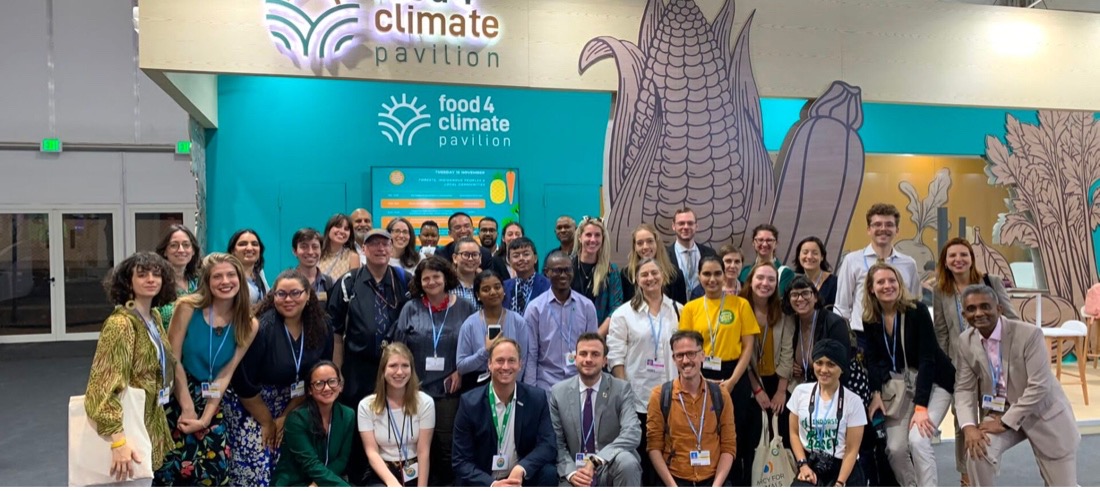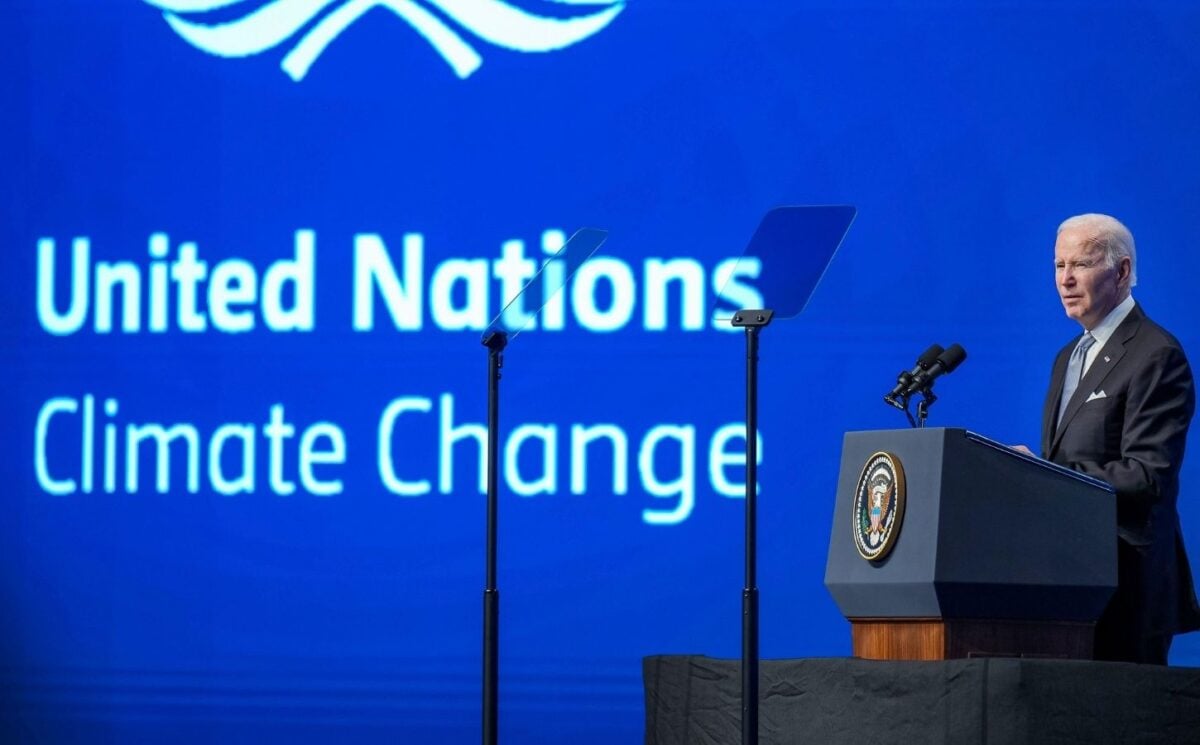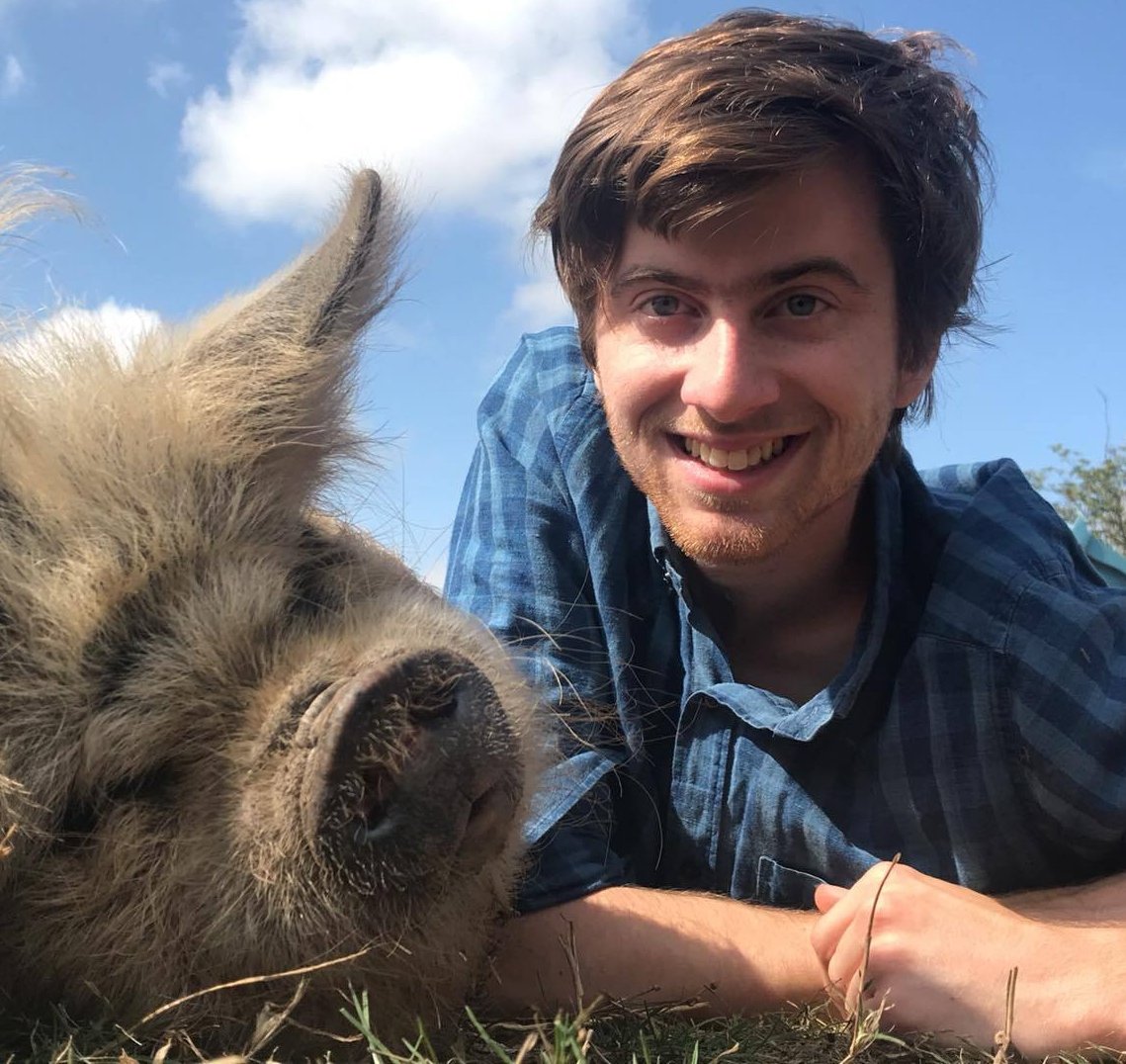After months of speculation and controversy, COP28 kicks off today (November 30) in Dubai. With the world on track to soar past the 1.5C degrees Celsius “limit” set out in the Paris Agreement, a serious shift in global systems is needed.
Animal agriculture is a major contributor to greenhouse gas emissions (GHG). It’s also driving deforestation, biodiversity loss, and pollution. As such, it should be a key talking point at any climate conference. Prior COP meetings, however, have largely failed to address this issue. As recently as 2021, at COP26 in Glasgow, beef was on the menu – but food system change was not. Last year, at COP27 in Sharm El Sheikh, a pavilion focusing on the importance of plant-based food was present for the first time. Despite this, food was still not given significant air time at the event.
This year, for the first time, food system change has a more prominent place on the schedule. COP28 will feature a whole day of talks on food, agriculture, and water. Hopes that food’s moment in the limelight might finally have come grew earlier this year when the hosts announced that COP28 would serve mostly vegan food.
It looks like we’re still a long way off from animal agriculture being taken as seriously as it needs to be at COP. But for food to take center stage at COP28, even for one day, is a major step forward. It is, in large part, thanks to ProVeg International and the Food4Climate Pavilion that animal farming is no longer getting a free pass.
“We simply can’t achieve net zero without switching to more plant-rich, balanced, and diversified diets,” Raphaël Podselver, Director of UN Affairs at ProVeg International, tells Plant Based News. “That is why the Food4Climate Pavilion is putting food systems transformation front and center of COP28.”
What is the Food4Climate Pavilion?
At COP28, as oily deals and private jet fumes swirl in the air, food campaigners are ready to present one of the key solutions to the climate crisis.
The Food4Climate Pavilion will be hosting events throughout COP28 on the topic of food system transformation. Situated in the Blue Zone and led by ProVeg International, the pavilion will bring together more than 20 partner organizations. These include World Animal Protection and Impossible Foods.

For two weeks, campaigners will be engaging delegates and policymakers on all matters relating to food sustainability.
“Food systems urgently need a seat at the table among other big emitters like gas, oil and transport,” says Podselver. “Gaining support from influential policymakers at every level will help to demonstrate the appetite for a transition towards more plant-based and balanced diets.”
Why should food system change be on the menu at COP28?
Food system change represents a huge opportunity for GHG reductions. However, its potential has so far been shackled by a mixture of corporate interests and government fear.
“The impact of our global food system on the environment has largely been factored out of discussions at the highest level of climate negotiations,” says Podselver.
Studies have repeatedly shown that transitioning to a plant-based food system would bring about enormous environmental benefits. It is also one of the few major solutions ready to be implemented without major new technology. Our global food system is thought to contribute to to around a third of GHGs. Animal agriculture specifically is thought to account for up to 20 percent of GHGs.
Food, Agriculture and Water Day
Now, for the first time, COP28 is dedicating a whole day to food, agriculture, and water.
As designated by the host president, December 10 will be “Food, Agriculture and Water Day”. According to the FAO, this will allow delegates to consider the “unique potential of agrifood systems as the linchpin for sustainable solutions.”
For ProVeg International, it is a major breakthrough. “Allocating an entire day of global climate talks to food, agriculture, and water for the first time carries immense importance,” says Podselver.
“It represents the growing recognition of the pivotal role food systems play in the warming of our planet.”
Subsidies and regulations to tackle food emissions
At COP28, the Food4Climate Pavilion will present the huge potential of food system transformation to the world’s most influential policymakers.
“The Pavilion will advocate for inclusive, science-based solutions to establish healthy, climate-friendly, cruelty-free, and equitable food systems,” says Podselver.
What does this look like in practice? Podselver explains that effective policies include the implementation of subsidies and incentives to prioritize plant-based food.
It can also involve regulations to increase the availability and affordability of plant-based options.
“Food systems transformation requires collaboration”
In the UK, the public’s expectations for COP28 are low. Leaked reports suggesting that the UAE is planning to use its role as host to secure oil deals would not have helped raise hopes.
So, what would a good COP28 for the Food4Climate Pavilion look like?
“For food systems transformation to be given the same platform as other big emitters like oil, gas and transport,” says Podselver. “And for real steps to be taken towards bringing about more humane and sustainable food systems.”
To achieve these steps will involve working with a range of people, many of whom may start out as skeptics. “A core belief of Food4Climate is that food systems transformation requires collaboration, not polarization,” adds Podselver.
As such, the Pavilion plans to engage delegates and influence key decision makers through its series of constructive talks. These will include events titled “Connecting the dots,” “Transforming consumption,” and “Cultivating a green generation.”
A big step up from COP27
The Food4Climate Pavilion has been here before. Last year, COP27 hosted ProVeg International and partners from around the world.
“This truly marked a shift in the UN’s approach to food systems,” says Podselver. “But COP27 was only the start of putting food system transformation on the climate agenda.
“This year we are already seeing positive developments as with the Presidencies Declarations or the FAO roadmap.”
It has been reported that the United Nations’ Food & Agriculture Organization (FAO) will make a landmark statement urging the world’s most-developed nations to limit their excessive meat consumption at COP28.
“The Food4Climate Pavilion can encounter resistance as policymakers often overlook the environmental impact of our food system,” laments Podselver.
Reasons for resistance include a belief that eating habits are a personal matter rather than an institutional one. There is also an element of resistance to change. “Some individuals purposefully remain unaware of the consequences of their eating habits… Getting governments on board with promoting plant-based diets and more sustainable food systems requires a combination of collaboration, education and advocacy.”
Awareness… and then?
For ProVeg, international conferences like COP28 are a great chance to raise awareness among various governments about the need to transform the global food system.
But how can the campaigners ensure the key takeaways don’t vanish along with the trails of delegates’ jet fumes?
Podselver recognizes the need to push for concrete commitments. “With clear policies, like the implementation of subsidies and regulations that increase the availability and affordability of plant-based options, we can support the government to shift behavior in this direction.
Big Meat’s lobbying efforts are a reminder that there is a lot of work still to do. But Podselver is resolute: “Transforming the global food system is a unique opportunity for real change.”






